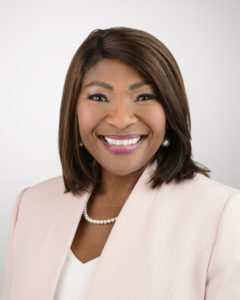THOUGHT LEADERSHIP
‘Be Authentic’: How Business Leaders Can Approach Conversations about Race in the Workplace

Crummer alumni candidly share the challenges black business leaders face and how to spark change in your organization.
Over the past few weeks, amid the national conversation on an unprecedented public health crisis a different kind of crisis has loomed over our nation as well – multiple acts of blatant and violent racism caught on camera.
The business community is at the forefront of the racial justice conversation. As Rollins and Crummer join many organizations in seeking more meaningful conversations around this issue, we turned to experts within our own community for their insights and suggestions.

Alumni Tadar Muhammad `17MBA, Ja’Mara Washington `16MBA, Olive Gaye ‘09MBA and John Gill `89MBA are Black business leaders with ideas how you can start having the tough conversations about race in your workplace, and ways you can start to create change.
Tadar Muhammad is currently a Senior Vice President at Home Builders Institute—a national nonprofit that, in addition to licensing curriculum to partnering schools; trains underserved populations, including veterans, transitioning military, Job Corps students and justice-involved youth and adults, with construction trades education—where he helps individuals in need of a second chance achieve careers in the residential construction industry. He is also an entrepreneur, husband and a proud father of four wonderful children.
Olive Gaye is the CEO and Founder of GenCare Resources, one of the premier home healthcare  organizations in Florida. GenCare Resources was named a 2017 Business to Watch by GrowFL and the Edwards Lowe Foundation. In 2018, Olive herself was named the Healthcare Business Leader of the Year by i4 Business Magazine.
organizations in Florida. GenCare Resources was named a 2017 Business to Watch by GrowFL and the Edwards Lowe Foundation. In 2018, Olive herself was named the Healthcare Business Leader of the Year by i4 Business Magazine.
John Gill the CEO and President of Quest, a nonprofit that supports  Central Floridians with developmental disabilities by offering choices and opportunities to live, learn, work and play. He has also served in executive positions at Walt Disney Co. and Darden Restaurants.
Central Floridians with developmental disabilities by offering choices and opportunities to live, learn, work and play. He has also served in executive positions at Walt Disney Co. and Darden Restaurants.
Ja’Mara is the Co-founder and COO of GreenwoodX, an organization aimed at leveling the playing field for  students and professionals in underrepresented communities. She believes, “everyone should have a fair shot at reaching their goals, regardless of race, gender, creed or access.” Outside of social enterprise, Ja’Mara is a Security Marketing Project Manager at Cisco Systems.
students and professionals in underrepresented communities. She believes, “everyone should have a fair shot at reaching their goals, regardless of race, gender, creed or access.” Outside of social enterprise, Ja’Mara is a Security Marketing Project Manager at Cisco Systems.
Addressing the Now
Gill, Muhammad, Gaye and Washington all say they are hurting and frustrated right now, along with millions of Americans.
“I’m dismayed,” said Gill. “It’s just the same cycle, and it doesn’t change. The cliché is ‘it could be me’, but the truth is it really could be me.”
Muhammad said he’s been rolling in and out of anger, but is more so feeling constantly disappointed that we as a nation haven’t made serious progress towards having these conversations.
“I’m disappointed at what the circumstances are today; I’m more angry at the fact that my children are faced with these challenges too,” he said.
While they all support the peaceful protesting happening across the world, they hope to see real change in the organizations that have built-in systemic challenges.
“For there to be real change, there needs to be a focus on sustainability,” said Olive Gaye. “We must stay united and unwavering in our quest for change.”
Having the Conversation
As a business leader, confronting this overwhelming subject can be very uncomfortable.
Gaye says it is OK to feel uncomfortable when you begin talking about these topics, but feeling uncomfortable is better than being complacent.
“We have been comfortable for far too long while racial injustices seethed and festered,” said Gaye. “The current climate provides the opportunity for business leaders to start this conversation, which meaningful, can change the world around us.”
Muhammad says now is a time to be empathetic, listen to your black colleagues, and start thinking about what you can do differently. He points out that authenticity is key at this time; leaders shouldn’t pretend to care or pretend to listen, but be active and intentional in their listening and understanding.
He also emphasizes that it is not the time to get defensive, which can be a common reaction when having this conversation.
“Be vulnerable,” he said. “The aftermath of George Floyd’s death exposed that this is not just something that happens now and again; we absolutely need to do something different.”
They say it is pertinent as a business leader to approach these conversations with a solution-oriented mindset, along with a high level of emotional intelligence.
The controversial term ‘white privilege’ has been an uncomfortable part of many of these conversations over the past weeks. Gill says it does not mean that you get extra things if you are white.
“It means that as a society, there’s a base level of benefits that you get, and if you’re a person of color, you don’t get that base level of benefits,” he explained.
According to Gill, those base level benefits may include things such as feeling comfortable when you are pulled over during a routine traffic stop or walking down a hair care aisle and not seeing what you need in an ethnic products section.
When it comes to adding diversity to your board or leadership team, Muhammad says there’s no reason to beat around the bush.
“It’s about being honest,” he said.
Muhammed points out that there are vast networks for black business people in Central Florida, and if you are honest and upfront with a black colleague that you would like to add diversity to your team, many times they will be more than happy to point you in the right direction.
“Oftentimes that conversation doesn’t happen,” said Muhammad. “We have to normalize that conversation.”
Gaye says a good idea internally would be to create a diversity goal, so there is measurable success in your organization.
“As leaders, we lead by example, every customer, internal or external is treated equally,” she said. “We start with that principle and put measures in place to create lasting change through open dialogue, active listening, sustainable measures and accountable outcomes.”
Creating Impact
So what can you do to help spark action?
Washington says it starts by not partaking in performative action.
“I, and a lot of us in the community, see organizations making posts and statements about how they stand with certain communities, but their corporate culture, demographics and leadership boards do not reflect that.” she said. “That’s being performative and stunts real, actionable change.”
Washington agrees with Muhammad that organizations should make sure what they are saying matches their actions.
Releasing a statement is one thing, but our experts say that is just the start to creating change.
Some companies pledged donations to organizations such as the NAACP and the Center for Policing Equality. Others, like Peloton, encouraged their employees to take a few hours out of their work day to self-educate and learn ways to practice anti-racism.
“It’s about being deliberate, and taking deliberate actions,” said Gill. “It’s business, government, nonprofits and education working together to create change.”
In order to avoid falling into “saying more than doing,” Gill, Muhammad and Washington all suggest creating action plans within your organization. Working with your company’s diversity and inclusion team is a great step, or creating one is another actionable idea.
“Embrace entrepreneurship [or intrapreneurship within an organization] to help create the tools that will create real change,” said Muhammad.
Washington also suggests, as an organization or business leader, looking in your backyard to empower those around you first.
“Be the organization where someone can say ‘this organization in my backyard helped empower me and got me to where I am’,” she says. “Think about your own community before you donate to one large blanket organization.”
Washington says consumers should look to promote Black-owned businesses and help empower fellow business leaders in their own communities.
“Donate to them, be a customer, write them great reviews, help them spread their visibility” she says.
At the end of the day, our experts emphasize this isn’t just a problem for Black Americans; it’s an issue that must be overcome as a country, with business leaders at the forefront to create change.
“We must harness this intensity we have to turn this into action that has impact,” said Gill. “We can have all this action, this kinetic activity, but it doesn’t yield anything. We need to be able to channel it in a way to make impact.”
Gaye echoed those sentiments.
“Addressing systemic bias and developing a culture of inclusion is not easy, but like every journey, it begins with the first step. But awareness and action are all attainable. Change won’t happen overnight, but we can do our part to embrace differences and actively create a representative workforce.”

